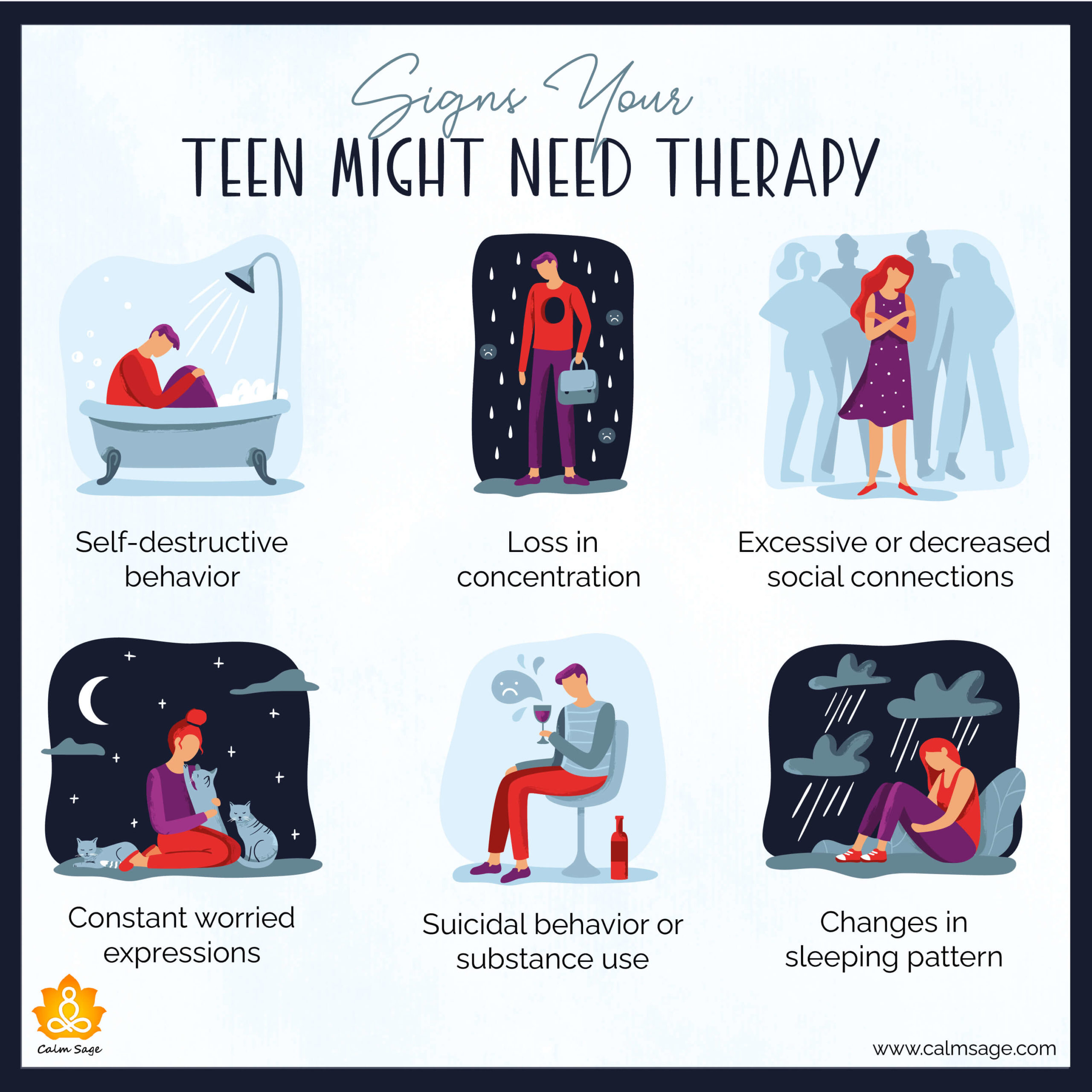The Role of Teenager Therapy in Promoting Resilience and Self-confidence
Teen years existing one-of-a-kind challenges that can impact psychological health. Treatment uses teens a structured setting to address these problems. It equips them with tools to build durability and confidence. By discovering to browse their emotions, teens can create a more powerful sense of self. The journey through therapy is not just concerning recognizing oneself; it likewise involves growing connections with others. What methods arise from this collaborative process?
Understanding the One-of-a-kind Difficulties Encountered by Teenagers
As teenagers browse the turbulent period of adolescence, they come across a myriad of special challenges that can significantly influence their durability and self-confidence. The change from childhood to adulthood is frequently fraught with public opinions, scholastic assumptions, and identification expedition. Peer relationships become increasingly complicated, with the desire for approval bring about stress and anxiety and instability. At the same time, the stress to master college may cause overwhelming tension, impacting psychological health and wellness and self-confidence.
Additionally, teenagers might have a hard time with self-image concerns, influenced by societal requirements bolstered through social media sites. The constant contrast can exacerbate feelings of insufficiency. Furthermore, several teens experience domestic challenges, such as separation or monetary instability, which can develop an unstable home atmosphere. These interconnected concerns contribute to a fragile sense of self-worth, making it vital for young adults to establish coping systems and assistance systems to navigate these formative years properly.
The Advantages of Treatment for Teens
Therapy offers teens an important source for developing resilience and self-confidence, particularly taking into account the many challenges they deal with. Engaging with a skilled expert allows teenagers to discover their thoughts and sensations in a safe environment, which can lead to boosted self-awareness. This understanding of their emotions helps them browse the complexities of teenage years extra successfully.
In addition, treatment offers adolescents with devices to take care of stress and anxiousness, promoting a sense of control over their lives. Via restorative strategies, they learn to reveal their sensations and communicate better with peers and household participants, which can improve relationships. Furthermore, therapy can aid adolescents identify their strengths and develop a positive self-image, adding to raised self-confidence. In this encouraging setup, they can additionally confront and reframe adverse thoughts, leading the method for healthier coping mechanisms and a much more resistant attitude. Eventually, the advantages of treatment can have a long-term influence on their personal advancement
Building Coping Strategies Via Treatment
Building coping strategies is an integral component of the healing process for adolescents. Treatment gives an organized atmosphere where teens can explore their ideas, sensations, and actions, permitting them to determine stress factors and activates in their lives. With various strategies, such as cognitive-behavioral therapy (CBT), adolescents learn to test negative idea patterns and replace them with more constructive feedbacks. Role-playing and mindfulness workouts are additionally employed to boost emotional guideline and problem-solving abilities.
In treatment, adolescents are motivated to establish personalized coping devices, such as journaling, deep breathing, or participating in exercises. These techniques not just assist them take care of immediate stress and anxiety but additionally promote long-term durability. As they practice these coping techniques, teenagers gain the self-confidence to face difficulties independently. Inevitably, developing reliable coping techniques outfits teenagers with important life abilities, fostering their capacity to navigate future difficulties with guarantee and toughness.

Enhancing Self-Esteem and Favorable Self-Image
While adolescents commonly grapple with insecurities and social stress, therapy plays a crucial role in enhancing self-esteem and promoting a positive self-image. Via numerous healing methods, teenagers discover to determine and challenge adverse ideas that threaten their self-worth. Cognitive-behavioral techniques, for instance, encourage them to change harmful self-talk with affirmations and positive ideas.
Furthermore, therapy supplies a secure area for teens to discover their feelings, enabling them to articulate their experiences and gain recognition. This procedure usually leads to enhanced self-acceptance and acknowledgment of their one-of-a-kind top qualities.
Therapists can present mindfulness techniques, assisting teenagers cultivate self-compassion and lower self-criticism. By addressing underlying concerns and promoting self-awareness, therapy equips teens to create an extra resilient and favorable self-image. Eventually, enhanced self-worth acts as a fundamental aspect for navigating life's challenges and seeking personal goals with self-confidence.
Producing Encouraging Relationships and Neighborhood Links

Supportive relationships and neighborhood links are important for teenagers as they browse the intricacies of growing up. These links provide a feeling of belonging and security, which promotes strength and self-confidence. In therapy, teenagers find out the relevance of bordering themselves with favorable important site influences, including buddies, family members, advisors, and area members - counselling for teens. Such relationships can function as a safety internet throughout challenging times, using psychological support and advice
Additionally, neighborhood links motivate involvement in social activities, volunteer job, or group programs that advertise teamwork and collaboration. These experiences not just improve social skills however also impart a feeling of purpose and obligation. With treatment, adolescents can determine and grow these encouraging networks, discovering you could try here to interact successfully and build depend on. Inevitably, fostering solid partnerships and community ties furnishes teenagers with the tools to deal with barriers, advertising psychological well-being and a positive overview on life.
Often Asked Questions
Just how Do I Know if My Teenager Needs Therapy?
Signs a teen might need therapy include consistent sadness, withdrawal from activities, changes in consuming or sleeping patterns, scholastic decline, material use, or enhanced irritability. Observing these behaviors can indicate the demand for professional support.
What Sorts of Treatment Are The Majority Of Effective for Teens?
Cognitive Behavioral Therapy (CBT), Dialectical Behavior Modification (DBT), and household treatment are typically efficient for teens. These techniques assist address emotional challenges, improve dealing abilities, and boost interaction within family members characteristics, advertising total health.
How Can Moms And Dads Assistance Their Teenager's Therapy Trip?

Parents can support their teen's treatment trip by proactively paying attention, motivating open interaction, going to sessions if welcomed, strengthening Website coping techniques discovered in treatment, and cultivating a secure, comprehending setting for psychological expression and development.
Is Treatment Confidential for Teenagers?
Therapy for young adults is normally private, advertising a secure area for open interaction. Therapists might reveal details if there is a danger of harm to the teenager or others, ensuring security remains a concern.
Just How Long Does Therapy Normally Last for Adolescents?
Treatment for teenagers generally lasts in between 8 to 20 sessions, depending on private demands and objectives. Frequency and period may vary, with some experiencing much shorter or longer procedures based on their special scenarios and reactions.
Treatment offers teens a crucial source for developing resilience and self-confidence, specifically in light of the many challenges they encounter. Furthermore, treatment can assist teens recognize their strengths and create a favorable self-image, contributing to increased confidence. Through numerous strategies, such as cognitive-behavioral treatment (CBT), teens discover to challenge adverse idea patterns and change them with more useful responses. While adolescents usually grapple with insecurities and societal stress, treatment plays a vital role in improving self-confidence and cultivating a favorable self-image. Cognitive Behavior Therapy (CBT), Dialectical Behavior Treatment (DBT), and household treatment are frequently effective for young adults.